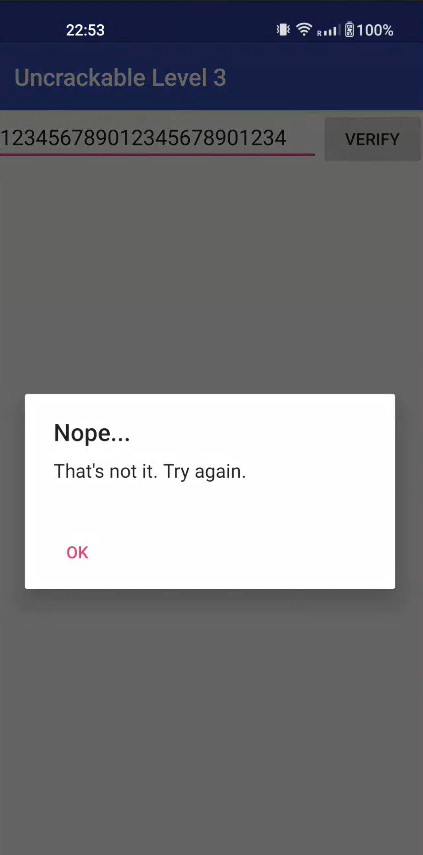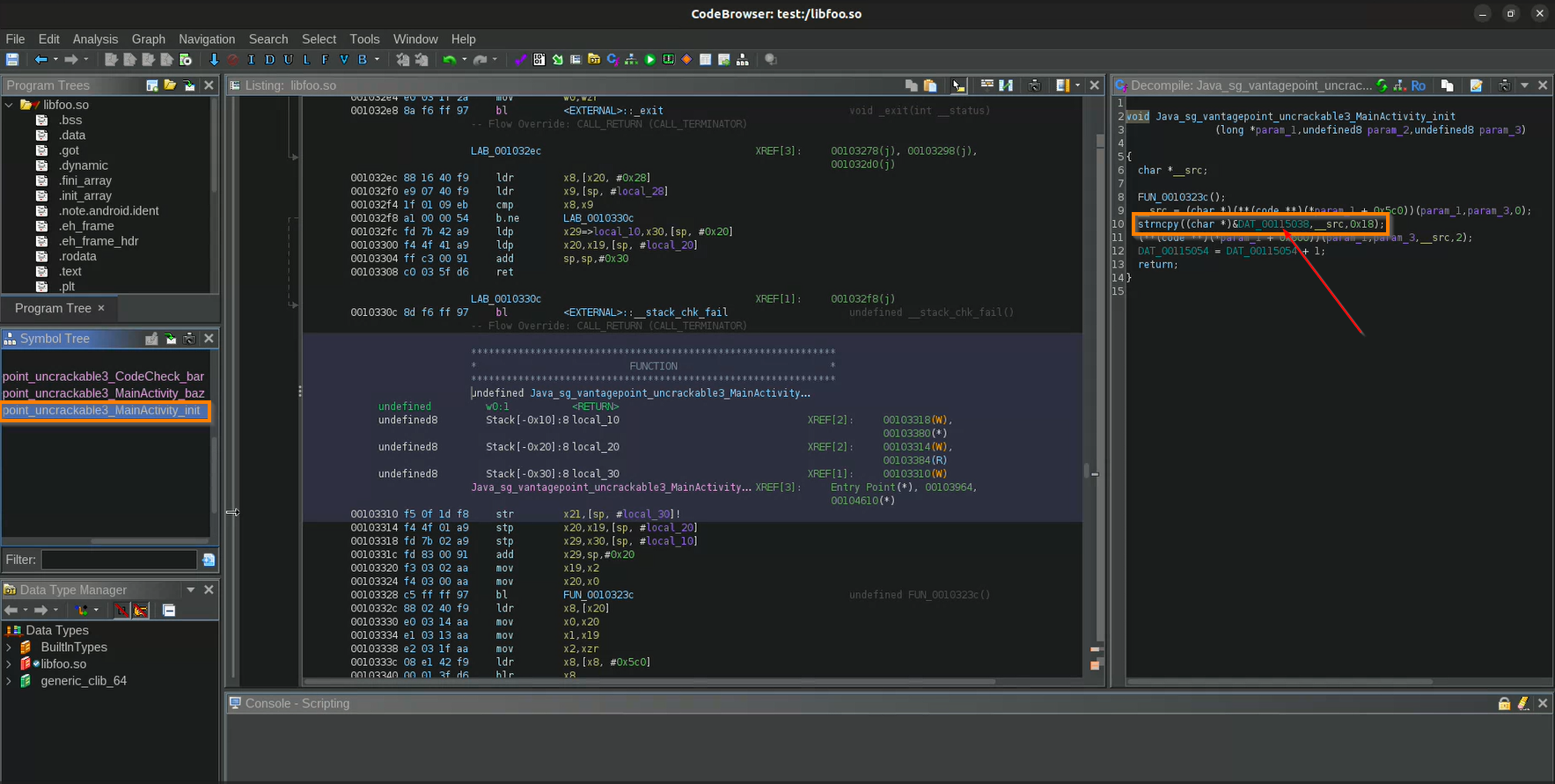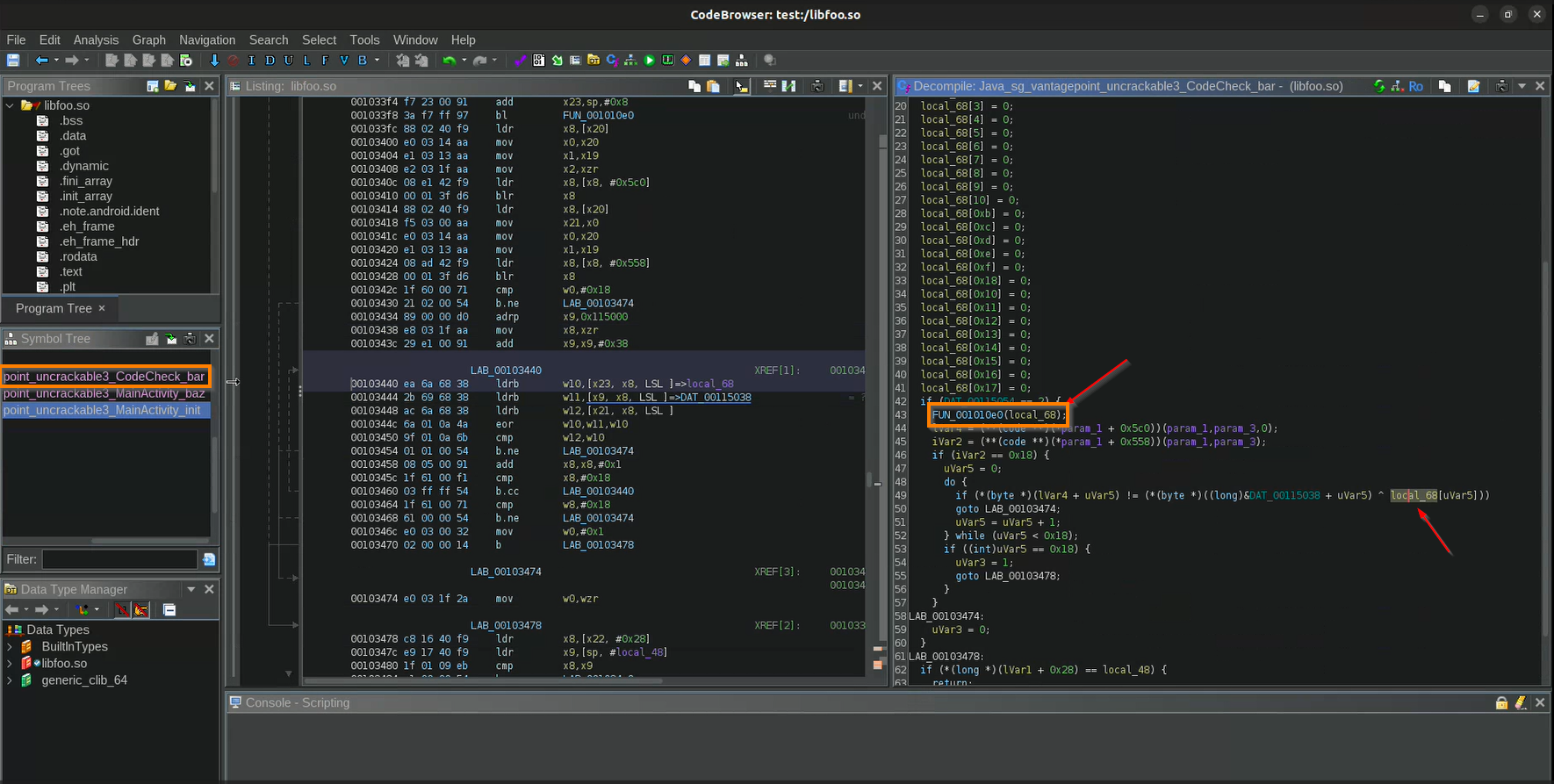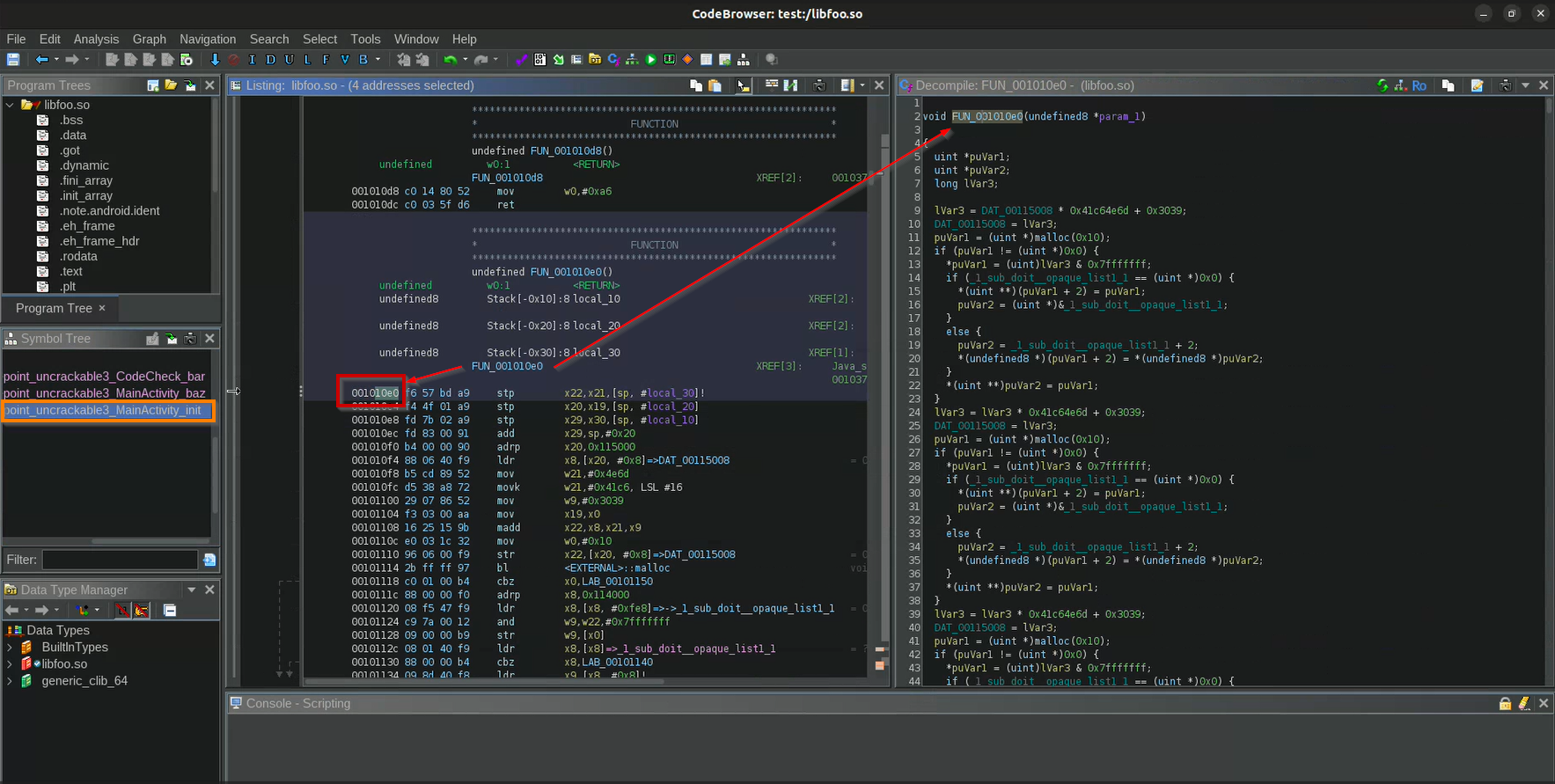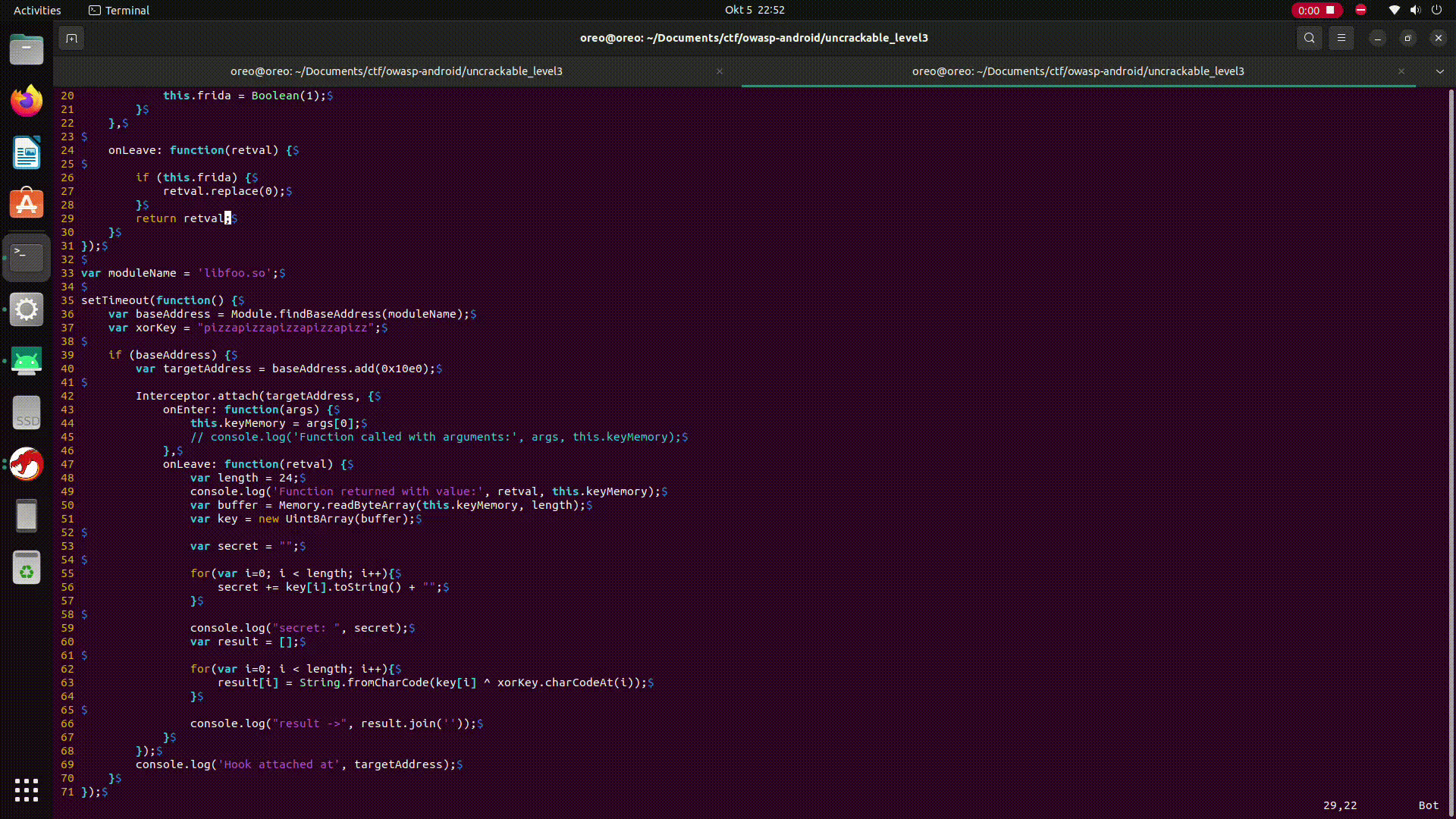Uncrackable - Level 3 | OWASP
OWASP Uncrackable | Level 3
Introduction
After a long time, I’m here again with a next challenge from owasp for Android Uncrackable Level 3. As usual, I’ll begin with the starting point, which is sg.vantagepoint.uncrackable3.MainActivity.
Without furthure ado, I started analyzing the MainActivity what’s new this time. In this level we need to put little more effort. If you check the code below from MainActivity, you can find this time we have anti-frida and integrity checks.
1
2
3
4
5
6
7
8
9
10
11
12
13
14
15
16
17
18
19
20
21
22
23
24
25
26
27
28
29
30
31
32
33
34
35
36
37
38
39
40
41
42
43
44
45
46
47
48
49
50
51
52
53
54
55
56
57
58
59
60
61
62
63
64
65
66
67
68
69
70
71
72
73
74
75
76
77
78
79
80
81
82
83
84
85
86
87
88
89
90
91
92
93
94
95
96
97
98
99
100
101
102
103
104
105
106
107
108
109
public class MainActivity extends AppCompatActivity {
private static final String TAG = "UnCrackable3";
static int tampered = 0;
private static final String xorkey = "pizzapizzapizzapizzapizz";
private CodeCheck check;
Map<String, Long> crc;
private native long baz();
private native void init(byte[] bArr);
/* JADX INFO: Access modifiers changed from: private */
public void showDialog(String str) {
AlertDialog create = new AlertDialog.Builder(this).create();
create.setTitle(str);
create.setMessage("This is unacceptable. The app is now going to exit.");
create.setButton(-3, "OK", new DialogInterface.OnClickListener() { // from class: sg.vantagepoint.uncrackable3.MainActivity.1
@Override // android.content.DialogInterface.OnClickListener
public void onClick(DialogInterface dialogInterface, int i) {
System.exit(0);
}
});
create.setCancelable(false);
create.show();
}
private void verifyLibs() {
this.crc = new HashMap();
this.crc.put("armeabi-v7a", Long.valueOf(Long.parseLong(getResources().getString(owasp.mstg.uncrackable3.R.string.armeabi_v7a))));
this.crc.put("arm64-v8a", Long.valueOf(Long.parseLong(getResources().getString(owasp.mstg.uncrackable3.R.string.arm64_v8a))));
this.crc.put("x86", Long.valueOf(Long.parseLong(getResources().getString(owasp.mstg.uncrackable3.R.string.x86))));
this.crc.put("x86_64", Long.valueOf(Long.parseLong(getResources().getString(owasp.mstg.uncrackable3.R.string.x86_64))));
try {
ZipFile zipFile = new ZipFile(getPackageCodePath());
for (Map.Entry<String, Long> entry : this.crc.entrySet()) {
String str = "lib/" + entry.getKey() + "/libfoo.so";
ZipEntry entry2 = zipFile.getEntry(str);
Log.v(TAG, "CRC[" + str + "] = " + entry2.getCrc());
if (entry2.getCrc() != entry.getValue().longValue()) {
tampered = 31337;
Log.v(TAG, str + ": Invalid checksum = " + entry2.getCrc() + ", supposed to be " + entry.getValue());
}
}
ZipEntry entry3 = zipFile.getEntry("classes.dex");
Log.v(TAG, "CRC[classes.dex] = " + entry3.getCrc());
if (entry3.getCrc() != baz()) {
tampered = 31337;
Log.v(TAG, "classes.dex: crc = " + entry3.getCrc() + ", supposed to be " + baz());
}
} catch (IOException unused) {
Log.v(TAG, "Exception");
System.exit(0);
}
}
/* JADX INFO: Access modifiers changed from: protected */
/* JADX WARN: Type inference failed for: r0v2, types: [sg.vantagepoint.uncrackable3.MainActivity$2] */
@Override // android.support.v7.app.AppCompatActivity, android.support.v4.app.FragmentActivity, android.support.v4.app.SupportActivity, android.app.Activity
public void onCreate(Bundle bundle) {
verifyLibs();
init(xorkey.getBytes());
new AsyncTask<Void, String, String>() { // from class: sg.vantagepoint.uncrackable3.MainActivity.2
/* JADX INFO: Access modifiers changed from: protected */
@Override // android.os.AsyncTask
public String doInBackground(Void... voidArr) {
while (!Debug.isDebuggerConnected()) {
SystemClock.sleep(100L);
}
return null;
}
/* JADX INFO: Access modifiers changed from: protected */
@Override // android.os.AsyncTask
public void onPostExecute(String str) {
MainActivity.this.showDialog("Debugger detected!");
System.exit(0);
}
}.execute(null, null, null);
if (RootDetection.checkRoot1() || RootDetection.checkRoot2() || RootDetection.checkRoot3() || IntegrityCheck.isDebuggable(getApplicationContext()) || tampered != 0) {
showDialog("Rooting or tampering detected.");
}
this.check = new CodeCheck();
super.onCreate(bundle);
setContentView(owasp.mstg.uncrackable3.R.layout.activity_main);
}
public void verify(View view) {
String obj = ((EditText) findViewById(owasp.mstg.uncrackable3.R.id.edit_text)).getText().toString();
AlertDialog create = new AlertDialog.Builder(this).create();
if (this.check.check_code(obj)) {
create.setTitle("Success!");
create.setMessage("This is the correct secret.");
} else {
create.setTitle("Nope...");
create.setMessage("That's not it. Try again.");
}
create.setButton(-3, "OK", new DialogInterface.OnClickListener() { // from class: sg.vantagepoint.uncrackable3.MainActivity.3
@Override // android.content.DialogInterface.OnClickListener
public void onClick(DialogInterface dialogInterface, int i) {
dialogInterface.dismiss();
}
});
create.show();
}
static {
System.loadLibrary("foo");
}
}
few more points to note.
- Something interesting here is a hard coded
xorkeywith length24which we might use later.
1
private static final String xorkey = "pizzapizzapizzapizzapizz";
- We have a lib to load and the name is
libfoo.so
1
System.loadLibrary("foo");
- two native functions
1
2
private native long baz();
private native void init(byte[] bArr);
Setting up the frida hook script
To start, we need to write a Frida hook script to run the app and input a 24-character long string.
1
frida -U -f owasp.mstg.uncrackable3 -l .\UnCrackable-Level3\level3.js
I used anti frida bypass code below from codeshare to save sometime
1
2
3
4
5
6
7
8
9
10
11
12
13
14
15
16
17
18
19
20
21
22
23
24
25
26
27
28
29
30
31
Java.perform(function() {
var hook = Java.use("java.lang.System");
hook.exit.implementation = function() {
console.log("Root Check Bypassed!!! 😎");
};
});
Interceptor.attach(Module.findExportByName("libc.so", "strstr"), {
onEnter: function(args) {
this.haystack = args[0];
this.needle = args[1];
this.frida = Boolean(0);
var haystack = Memory.readUtf8String(this.haystack);
var needle = Memory.readUtf8String(this.needle);
if (haystack.indexOf("frida") !== -1 || haystack.indexOf("xposed") !== -1) {
this.frida = Boolean(1);
}
},
onLeave: function(retval) {
if (this.frida) {
retval.replace(0);
}
return retval;
}
});
With the basic bypass script ready, we can proceed to the main mission.
Analyzing the Code
If you check the code above, we have a line where xorkey is getting used so I started with it for the next step.
1
init(xorkey.getBytes());
Since the init function is defined in the native library, we need to load the native library in Ghidra to analyze the init function.
Understanding the Native Code
The strncpy function is used as follows:
char * strncpy ( char * destination, const char * source, size_t num );
if you know about the strncpy it’s clear that the source char pointer is DAT_00115038 which is our point of interest. When I check where else does DAT_00115038 is getting used and I found that it’s another function from nativ lib which is CodeCheck_bar. Don’t forget to check if size of the comparison, which is 0x18 i.e. 24 in decimal (do you still remember what we had earlier?).
The source char pointer is DAT_00115038, which is our point of interest. This pointer is also used in another function from the native library, CodeCheck_bar. Note that the size of the comparison is 0x18, which is 24 in decimal (matching our XOR key length).
The local variable local_68 is used in an if condition and is first populated inside the function FUN_001010e0. This function contains 1000 lines of code, making it impractical to check manually. However, the function parameter shows that the variable passed is a pointer, meaning something has returned from this function will be stored at that memory address. Since this function is not exported, we need its address to hook it. Ghidra shows the function’s address as (0x10e0).
Key Points to Remember
Before continuing with the hook script, keep these points in mind:
- We need to get the secret used with the XOR key.
- We need to XOR that key to find the actual result.
Writing the Script
With these points in mind, let’s write the script. Ensure the native library is loaded before Frida starts hooking it (a lesson learned the hard way).
1
2
3
4
5
6
7
8
9
10
11
12
13
14
15
16
17
18
19
20
21
22
23
24
25
26
27
28
29
30
31
32
33
34
35
36
37
38
var moduleName = 'libfoo.so';
setTimeout(function() {
var baseAddress = Module.findBaseAddress(moduleName);
var xorKey = "pizzapizzapizzapizzapizz";
if (baseAddress) {
var targetAddress = baseAddress.add(0x10e0);
Interceptor.attach(targetAddress, {
onEnter: function(args) {
this.keyMemory = args[0];
},
onLeave: function(retval) {
var length = 24;
console.log('Function returned with value:', retval, this.keyMemory);
var buffer = Memory.readByteArray(this.keyMemory, length);
var key = new Uint8Array(buffer);
var secret = "";
for(var i=0; i < length; i++){
secret += key[i].toString() + "";
}
console.log("secret: ", secret);
var result = [];
for(var i=0; i < length; i++){
result[i] = String.fromCharCode(key[i] ^ xorKey.charCodeAt(i));
}
console.log("result ->", result.join(''));
}
});
console.log('Hook attached at', targetAddress);
}
}, 2000);
Conclusion
Let’s run the script and complete this challenge!
1
2
3
4
5
6
7
8
9
10
11
12
13
14
15
16
17
(base) oreo@oreo:~/Documents/ctf/owasp-android/uncrackable_level3$ frida -l level3.js -f owasp.mstg.uncrackable3 -U
____
/ _ | Frida 16.3.3 - A world-class dynamic instrumentation toolkit
| (_| |
> _ | Commands:
/_/ |_| help -> Displays the help system
. . . . object? -> Display information about 'object'
. . . . exit/quit -> Exit
. . . .
. . . . More info at https://frida.re/docs/home/
. . . .
. . . . Connected to LE2101 (id=4a298ca9)
Spawned `owasp.mstg.uncrackable3`. Resuming main thread!
[LE2101::owasp.mstg.uncrackable3 ]-> Hook attached at 0x7a999df0e0
Function returned with value: 0x7a263a4720 0x7fef0dea38
secret: 298171915237321130325902919218149002381920
result -> making owasp great again
Thanks for following along! Cheers 🍺
